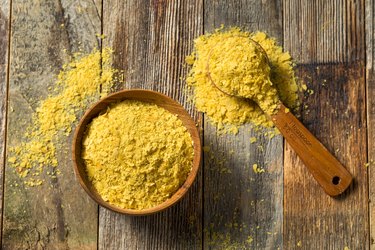
Nutritional yeast is a staple in many health food stores. It's popular with vegetarians and vegans due to its slightly cheesy flavor. But will nutritional yeast contribute to candida infections? Don't let the term "yeast" scare you. It's not the culprit for a yeast or candida infection.
Yeast infections start from an overgrowth of yeast already in your body, not from nutritional yeast.
Video of the Day
Video of the Day
Nutritional yeast, typically yellow flakes or powder, is a rich source of vitamins and nutrients, says Monique Dorsey, RD, LDN, a registered dietitian at McGovern Medical School at UTHealth in Houston, Texas. "I have not seen any evidence that yeast infections are related to nutritional yeast consumption," she says.
Nutritional Yeast and Yeast Infections
A certain amount of yeast on your skin, digestive system, or in your vagina is totally normal, according to Johns Hopkins Medicine. The problems start when yeast grows out of control and that natural balance is thrown off, leading to a yeast infection, also called candidiasis.
Yeast is more likely to grow under certain conditions, like:
- If you have damaged skin
- If you have a weakened immune system already
- If you're taking antibiotics that throw off the normal balance of bacteria and yeast
- If there are warm and humid conditions
Nutritional yeast is grown specifically to use as a food supplement, according to the University of Massachusetts Medical School Center for Applied Nutrition (CAN). Although it's a fungus, like other yeasts, the yeast cells are killed during manufacturing, so they're not alive when you use it. Dead yeast — yum? Well, yes, because it means it's impossible for it to cause an infection. So if you're worried about developing a yeast infection as a result of adding those yellow flakes to a meal, you can rest easy and sprinkle away.
What Are the Benefits of Nutritional Yeast?
"Nutritional yeast is a nutrient-dense food product that comes with several beneficial contributions to a balanced diet," Dorsey says. Nutritional yeast is:
- A great protein source, with a high amount per serving
- A high source of B vitamins, which is important for someone who may be using it to supplement a plant-based diet
- A good source of valuable trace minerals such as iron, zinc and selenium
- A good source of antioxidants (especially selenium), which are protective against certain diseases and oxidative stress
Nutritional yeast can be used in vegetarian recipes as a cheese substitute because it has a cheesy flavor and a cheesy yellow color, according to CAN. It can also be sprinkled over food. Substituting nutritional yeast for cheese can help you cut back on your dairy intake if that's your goal.
Of course, nutritional yeast isn't the only type of yeast, but it is in the same family of yeasts as baker's yeast, which helps bread rise, and brewer's yeast, which is used to brew beer. The biggest difference is that those yeasts are alive and active in order to do their job, whereas nutritional yeast is not.
Can Nutritional Yeast Have Side Effects?
"Nutritional yeast can have side effects in individuals who may have a sensitivity or intolerance to the product. As with many foods and dietary supplements, it's important to practice moderation," Dorsey says.
Some people may be allergic to yeast and mold, according to the Academy of Nutrition and Dietetics. If you have this allergy, you may need to avoid all types of yeasts, which would include nutritional yeast. You may also need to avoid these foods that have yeast:
- Baked goods
- Alcoholic beverages
- Savory spreads, like Marmite and Vegemite
- Sourdough bread
Finally, according to CAN, some people may be sensitive to yeasts. People with inflammatory bowel diseases, especially Crohn's disease, may find that yeast triggers their symptoms. And there's some evidence that a component of nutritional yeast might trigger a headache or even a migraine for some people. For most people though, nutritional yeast is a safe and nutrient-dense food that can offer several health benefits. If in doubt, check with your doctor to see if it's safe for you.
- Monique Dorsey, MS, RD, LDN, registered dietitian, University of Texas Health Science Center (UTHealth), Houston
- Johns Hopkins Medicine: “Yeast Infection”
- University of Massachusetts Medical School Center for Applied Nutrition: “Nutritional Yeast – Nourishing or No-Go?”
- Academy of Nutrition and Dietetics: “Is There a Diet for Yeast Allergy?”
Is this an emergency? If you are experiencing serious medical symptoms, please see the National Library of Medicine’s list of signs you need emergency medical attention or call 911.